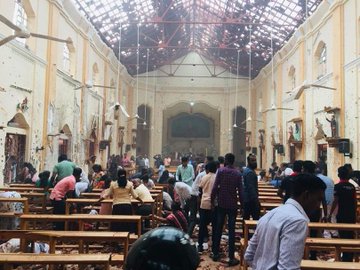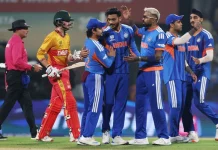
At least 156 people were killed and nearly 500 injured as a series of near-simultaneous explosions ripped through three churches and three high-end hotels in three Sri Lankan cities on Easter.
The blasts hit three hotels and one church in Colombo, while two other churches were targeted in Negombo and Batticaloa, police said. The death toll included worshippers and hotel guests, and is expected to rise.
The nature of the blasts was not immediately clear, but an official speaking on condition of anonymity said police suspects the blasts at the churches in Colombo and Batticaloa were carried out by suicide bombers.
There have been no immediate claims of responsibility.
At a glance:
- Three hotels ─ Cinnamon Grand, Shangri-La and Kingsbury ─ targeted in Colombo
- One church targeted each in Colombo (St Anthony’s Shrine), Negombo (St Sebastian’s Church) and Batticaloa (Zeon Church)
- At least 45 killed in Colombo blasts: police
- At least 25 killed in Batticaloa blast: police
- At least 67 killed in Negombo blast: police
- 35 foreigners ─ including Dutch, US and UK citizens ─ dead: police
- Nearly 500 injured, death toll expected to climb
The first explosions were reported at St Anthony’s Church in Colombo and St Sebastian’s Church in the town of Negombo just outside the capital.
Shortly after those blasts were reported, police confirmed three hotels in the capital had also been hit, along with a church in the town of Batticalao, in the east of the country.

A person identified as Alex Agieleson who was near the shrine at the time said that nearby buildings shook with the impact of the blast, and that he saw a number of injured people being carried away in ambulances.
Local TV showed damage at the Cinnamon Grand, Shangri-La and Kingsbury hotels in the capital. The Shangri-La’s second-floor restaurant was gutted in the blast, with the ceiling and windows blown out. Loose wires hung and tables were overturned in the blackened space.
A police magistrate was at the hotel to inspect the bodies recovered from the restaurant. From outside the police cordon, several bodies could be seen covered in white sheets.
Photos circulating on social media showed the roof of one church had been almost blown off in the blast. The floor was littered with a mixture of roof tiles, splintered wood and blood. Several people could be seen covered in blood, with some trying to help those with more serious injuries. The images could not immediately be verified.

Police chief warned of threat 10 days ago
According to a document accessed by AFP, the Sri Lankan police chief had warned of possible suicide attacks targeting “prominent churches” in a nationwide alert 10 days ago.
Police chief Pujuth Jayasundara sent an intelligence warning to top officers on April 11 setting out the threat.
“A foreign intelligence agency has reported that the National Thowheed Jama’ath (NTJ) is planning to carry out suicide attacks targeting prominent churches as well as the Indian High Commission in Colombo,” said the alert. The NTJ came to notice last year when it was linked to the vandalisation of Buddhist statues.
SL PM calls emergency meeting
Sri Lankan Prime Minister Ranil Wickremesinghe condemned the attacks and called an emergency security council meeting, official told media.

“I strongly condemn the cowardly attacks on our people today. I call upon all Sri Lankans during this tragic time to remain united and strong,” Wickremesinghe said in a Tweet. “Please avoid propagating unverified reports and speculation. The government is taking immediate steps to contain this situation.”
Minister of Economic Reforms and Public Distribution, Harsha de Silva, tweeted: “Emergency meeting called in a few minutes. Rescue operations underway.”
He said he had been to two of the attacked hotels and was at the scene at St Anthony’s Shrine, where he described “horrible scenes”.
“I saw many body parts strewn all over,” he tweeted, adding that there were “many casualties including foreigners”.
“Please stay calm and indoors,” he added.
President Maithripala Sirisena, in an address following the attacks, said he was shocked by the explosions and appealed for calm.
Finance Minister Mangala Samaraweera, writing on his verified Twitter account, said the attacks had killed “many innocent people” and appeared to be a “well-coordinated attempt to create murder, mayhem and anarchy.”
The Pakistani Foreign Office retweeted contact information for the Pakistani High Commission in Colombo for Pakistani nationals in Sri Lanka.
Embassies in Colombo warned their citizens to shelter in place, and Sri Lankan Airlines told customers to arrive at the airport four hours ahead of flights because of ramped-up security in the wake of the attacks.
SL Christians targeted by discrimination, violence
Only a small fraction of mainly Buddhist Sri Lanka is Catholic, but the religion is seen as a unifying force because it includes people from both the Tamil and majority Sinhalese ethnic groups.
Last year, there were 86 verified incidents of discrimination, threats and violence against Christians, according to the National Christian Evangelical Alliance of Sri Lanka (NCEASL), which represents more than 200 churches and other Christian organisations.
This year, the NCEASL recorded 26 such incidents, including one in which Buddhist monks allegedly attempted to disrupt a Sunday worship service, with the last one reported on March 25.
Out of Sri Lanka’s total population of around 22 million, 70pc are Buddhist, 12.6pc Hindu, 9.7pc Muslim, and 7.6pc Christian, according to the country’s 2012 census.
In its 2018 report on Sri Lanka’s human rights, the US State Department noted that some Christian groups and churches reported they had been pressured to end worship activities after authorities classified them as “unauthorised gatherings”.
The Catholic Church in the Holy Land voiced support for Sri Lanka’s Christians and condemned the attacks. A statement issued in Jerusalem said the blasts were particularly sad as they “came while Christians celebrate Easter.”
“We pray for the souls of the victims and ask for speedy recovery of the injured, and ask God to inspire the terrorists to repent of their killing and intimidation,” the statement said.
“We also express our solidarity with Sri Lanka and all its inhabitants in their various religious and ethnic backgrounds.”
‘We stand with Sri Lanka’
Prime Minister Imran Khan strongly condemned the “horrific terrorist attack in Sri Lanka on Easter Sunday”.
“My profound condolences go to our Sri Lankan brethren. Pakistan stands in complete solidarity with Sri Lanka in their hour of grief,” he tweeted.
Pakistan condemns the terrorist attacks in Sri Lanka, the Foreign Office spokesperson tweeted.
“The people and Government of Pakistan stand by the people and Government of Sri Lanka at this moment of tragedy and against terror,” Dr Mohammad Faisal said.
Minister for Human Rights Shireen Mazari condemned the attack in a tweet, saying that terrorism needs a strong united global approach to be effectively defeated worldwide.
“We stand with our Sri Lankan brethren as they confront these brutal terrorist attacks,” Mazari said.



